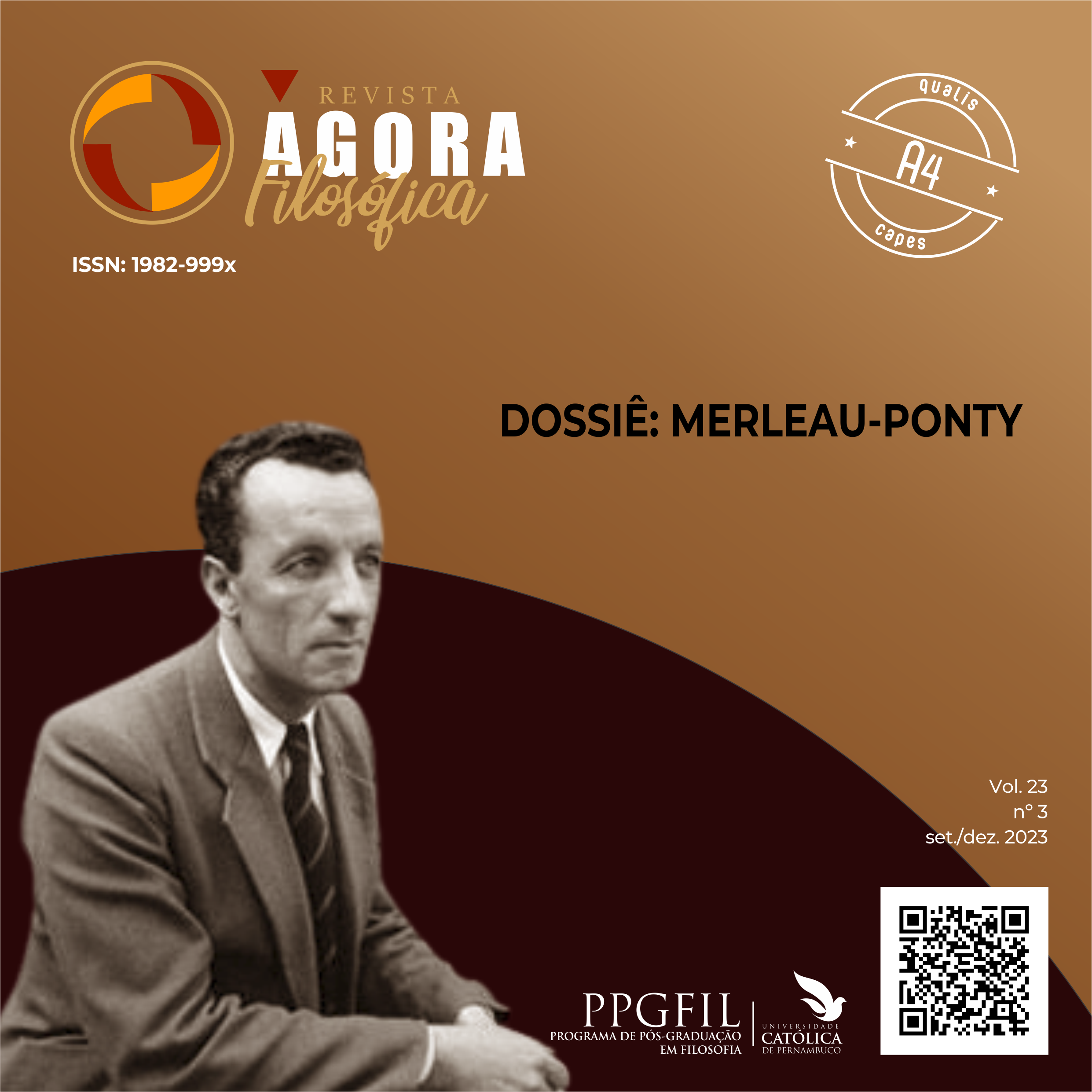Merleau-Ponty and Wittgenstein escape the opposition between science and faith supported on the alienating absolutism of an obtuse radicalism
DOI:
https://doi.org/10.25247/P1982-999X.2023.v23n3.p97-113Keywords:
beliefs, reason, Merleau-Ponty, Wittgenstein, absolute stanceAbstract
This article aims to address the conflicting relationship between science and faith, with a view to showing the impossibility of invalidating both the field of science and the field of faith. With this, the thesis is defended that to invalidate means to assume an absolutist stance whose main characteristic is the alienating subjection derived from an obtuse radicalism, that is, radical positions make individuals alienated by becoming subject in a closure. To this end, the elaborations of Maurice Merleau-Ponty are based mainly on his doctoral thesis Phénoménologie de la Perception (1945). Throughout the article, some notes from his other works are collected with the aim of illustrating a legitimizing stance regarding the importance of openness to incompleteness, concerning science, as well as religion. Finally, it deals with Ludwig Wittgenstein's theorization in Lectures and Conversations on Aesthetics, Psychology and Religious Belief (1967), approaching his fideistic conception of belief in God not from the perspective of factual, rational and/or empirical beliefs, but viewed for him, as a way of seeing the world and positioning himself in it. The parallel between the aforementioned authors serves to corroborate the thesis that it is unfeasible to think about science and faith from an essentially Cartesian perspective, but, above all, to highlight the impossibility of explaining faith scientifically, or to nullify its importance in the human path, in addition to to recognize the value of science for the evolution of humanity.
Downloads
References
AMESBURY, R. ‘Fideism’, The Stanford Encyclopaedia of Philosophy, (ed.)E. Zalta, 2005. Disponível em: http://plato.stanford.edu/entries/fideism/.
CAMINHA, Iraquitan de Oliveira. O Distante-próximo e o próximo-distante: Corpo e Percepção na Filosofia de Merleau-Ponty. João Pessoa: Editora Universitária da UFPB, 2010.
CAMINHA, Iraquitan de Oliveira; SILVA, Marcos Érico de Araújo. Percepção, corpo e subjetividade. São Paulo: LiberArs, 2013.
CAMINHA, Iraquitan de Oliveira. Percepção, paisagem e linguagem em Merleau-Ponty. Trilhas Filosóficas. Revista Acadêmica de Filosofia, Caicó-RN, ano VIII, n. 1, p. 119-129, jan./jun. 2015. ISSN 1984-5561.
CAMINHA, Iraquitan de Oliveira. 10 lições sobre Merleau-Ponty. Rio de Janeiro: Vozes, 2019. (Coleção 10 Lições).
CLARK, K. J. ‘Religious epistemology’, Internet Encyclopaedia of Philosophy, (eds.) B. Dowden & J. Fieser, 2009. Disponível: http://www.iep.utm.edu/r/relig-ep.htm.
DESCARTES, René. Meditações metafísicas. Tradução: Maria Ermantina de Almeida Prado Galvão. 2. ed. São Paulo: Martins Fontes, 2005. (Clássicos).
FORREST, P. ‘The epistemology of religion’. Stanford Encyclopaedia of Philosophy, (ed.) E. Zalta, 2009. Disponível: http://plato.stanford.edu/entries/religion-epistemology/.
GRECO, J. ‘Reformed epistemology’, The Routledge Companion to the Philosophy of Religion, (eds.) C. Meister & P. Copan, 629-39, London: Routledge, 2007.
MERLEAU-PONTY, Maurice. O primado da percepção e suas consequências filosóficas. Tradução: Sílvio Rosa Filho e Thiago Martins. 1. ed. Belo Horizonte: Autêntica Editora, 2017. (Filô).
MERLEAU-PONTY, Maurice. A união da alma e do corpo em Malebranche, Biran e Bergson. Tradução de Sílvio Rosa Filho e Thiago Martins. 1. ed. Belo Horizonte: Autêntica Editora, 2017. (Filô).
MERLEAU-PONTY, Maurice. A Estrutura do comportamento. Tradução de Márcia Valéria Martinez de Aguiar. 5. ed. São Paulo: Editora WMF Martins Fontes, 2018. (Tópicos)
MERLEAU-PONTY, Maurice. Fenomenologia da percepção. Tradução: Carlos Alberto Ribeiro de Moura. São Paulo: Martins Fontes, 2006.
MERLEAU-PONTY, Maurice. O olho e o espírito. Tradução: Paulo Neves e Maria Ermantina Galvão Gomes Pereira. 2. ed. São Paulo: Cosac Naify, 2015.
MERLEAU-PONTY, Maurice. O visível e o invisível. São Paulo: Perspectiva, 2014.
NIELSEN, Kai. Wittgensteinian fideism. Philosophy, v. 42, n. 161, p. 191-209, 1967.
PLANTINGA, Alvin. The foundations of theism: a reply. Faith and Philosophy, v. 3, n. 3, p. 298-313, 1986.
PRITCHARD, Duncan. Reforming reformed epistemology. International Philosophical Quarterly, v. 43, n. 1, p. 43-66, 2003.
WITTGENSTEIN, L. Wittgenstein’s lectures and conversations on aesthetics, psychology and religious belief, (ed.) C. Barrett, Oxford: Blackwell, 1967.
WITTGENSTEIN, L. Investigações filosóficas. Tradução: José Carlos Bruni. São Paulo: Nova Cultural, 1999.
Downloads
Published
Issue
Section
License
Copyright (c) 2023 Mônica Parreiras

This work is licensed under a Creative Commons Attribution 4.0 International License.
You are free to:
- Share — copy and redistribute the material in any medium or format for any purpose, even commercially.
- Adapt — remix, transform, and build upon the material for any purpose, even commercially.
- The licensor cannot revoke these freedoms as long as you follow the license terms.
Under the following terms:
- Attribution — You must give appropriate credit , provide a link to the license, and indicate if changes were made . You may do so in any reasonable manner, but not in any way that suggests the licensor endorses you or your use.
- No additional restrictions — You may not apply legal terms or technological measures that legally restrict others from doing anything the license permits.
Notices:
You do not have to comply with the license for elements of the material in the public domain or where your use is permitted by an applicable exception or limitation .
No warranties are given. The license may not give you all of the permissions necessary for your intended use. For example, other rights such as publicity, privacy, or moral rights may limit how you use the material.
















